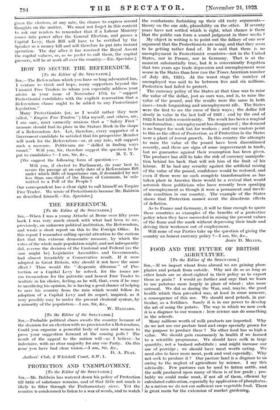PROTECTION AND UNEMPLOYMENT.
[To the Editor of the SPECTATOR.] SIR,—Mr. Baldwin has watered down his policy of Protection till little of substance remains, and of that little not much is likely to filter through the Parliamentary sieve. Yet the country is condemned to listen to a war of words, and to watch
the combatants furbishing up their old rusty arguments— theory on the one side, plausibility on the other. If seventy years have not settled which is right, what chance is there that the public can form a sound judgment in three weeks ?
My object in writing is to point out the fallacy of one new argument that the Protectionists are using, and that they seem to be getting rather fond of. It is said that there is no unemployment in Protectionist countries—not in the United States, nor in France, nor in Germany. That is at the moment substantially true, but it is conveniently forgotten that two years ago trade depression and unemployment were worse in the States than here (see the Times American number of July 4th, 1921)'. At the worst stage the number of unemployed was said to be between five and six millions. Protection had failed to protect.
The currency policy of the States at that time was to raise the value of the dollar, just as ours was, and is, to raise the value of the pound, and the results were the same in both Cases—trade languishing and unemployment rife. The States were the first to see the error of their ways ; the dollar fell slowly in value in the last half of 1921 ; and by the end of 1922 it had fallen considerably. The result has been a magical transformation ; unemployment has disappeared ; the demand is no longer for work but for workers ; and our orators point to this as the effect of Protection, as if Protection in the States were a plant of recent growth. In this country the attempts to raise the value of the pound have been discontinued recently, and there are signs of some improvement in trade, but no guarantee against their resumption has been given. The producer has still to take the risk of currency manipula- tion behind his back that will rob him of the fruit of his labour. If he had any security against the artificial raising of the value of the pound, confidence would be restored, and even if there were no such complete transformation as has taken place in America there would be a revival that would astonish those politicians who have recently been speaking of unemployment as though it were a permanent and inevit- able condition in our country. The example of the States shows that Protection cannot avert the disastrous effects of deflation.
As to France and Germany, it will be time enough to quote these countries as examples of the benefits of a protective policy when they have succeeded in raising the present values of the franc and the mark without depressing their trade and driving their workmen out of employment.
Will none of our Parties take up the question of giving the country an honest currency policy ?—I am, Sir, &c.,
JOHN D. MILLER.


















































 Previous page
Previous page